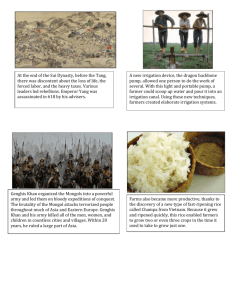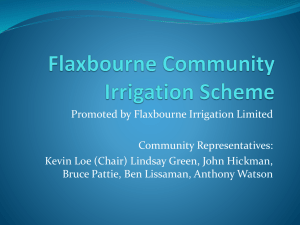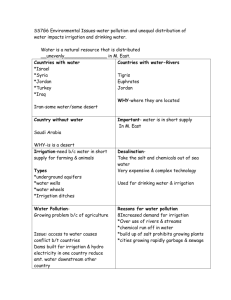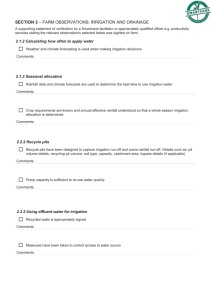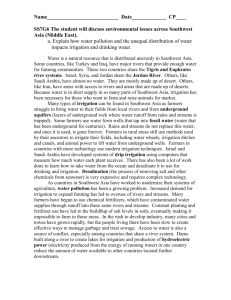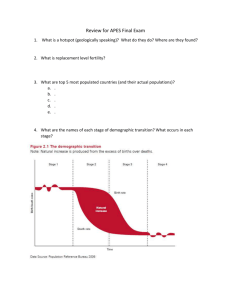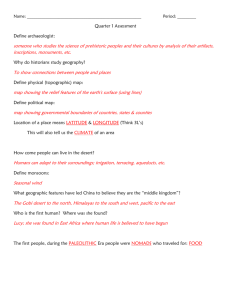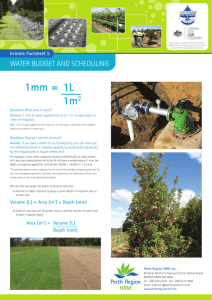Jalgaon declaration_Seminar on water and food
advertisement
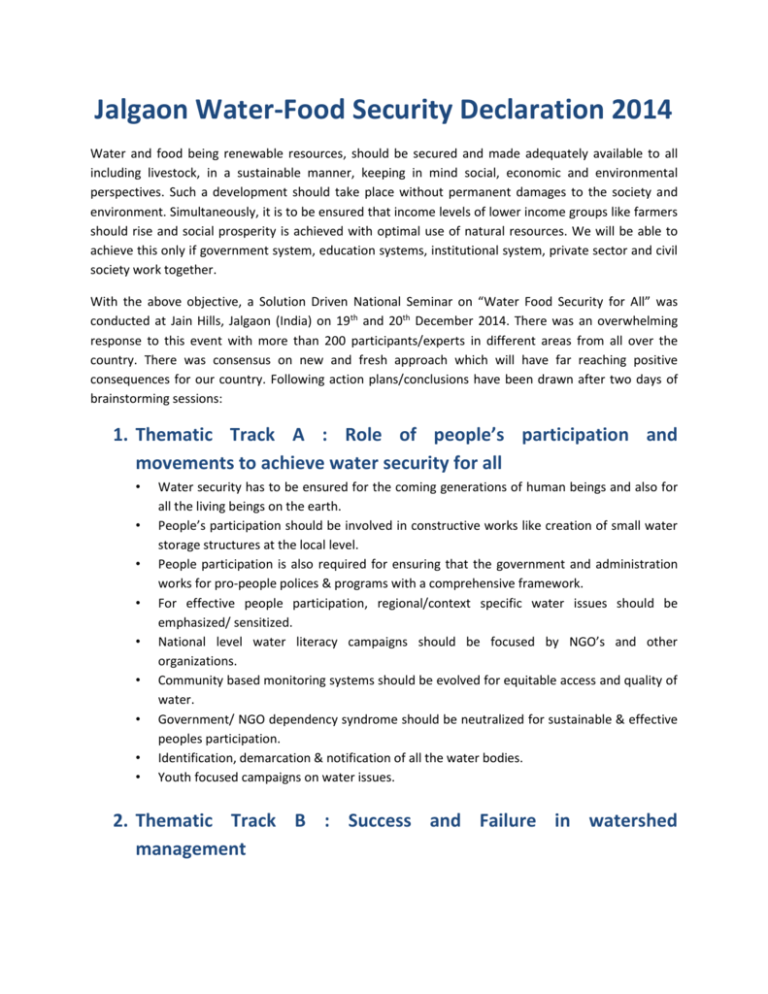
Jalgaon Water-Food Security Declaration 2014 Water and food being renewable resources, should be secured and made adequately available to all including livestock, in a sustainable manner, keeping in mind social, economic and environmental perspectives. Such a development should take place without permanent damages to the society and environment. Simultaneously, it is to be ensured that income levels of lower income groups like farmers should rise and social prosperity is achieved with optimal use of natural resources. We will be able to achieve this only if government system, education systems, institutional system, private sector and civil society work together. With the above objective, a Solution Driven National Seminar on “Water Food Security for All” was conducted at Jain Hills, Jalgaon (India) on 19th and 20th December 2014. There was an overwhelming response to this event with more than 200 participants/experts in different areas from all over the country. There was consensus on new and fresh approach which will have far reaching positive consequences for our country. Following action plans/conclusions have been drawn after two days of brainstorming sessions: 1. Thematic Track A : Role of people’s participation and movements to achieve water security for all • • • • • • • • • Water security has to be ensured for the coming generations of human beings and also for all the living beings on the earth. People’s participation should be involved in constructive works like creation of small water storage structures at the local level. People participation is also required for ensuring that the government and administration works for pro-people polices & programs with a comprehensive framework. For effective people participation, regional/context specific water issues should be emphasized/ sensitized. National level water literacy campaigns should be focused by NGO’s and other organizations. Community based monitoring systems should be evolved for equitable access and quality of water. Government/ NGO dependency syndrome should be neutralized for sustainable & effective peoples participation. Identification, demarcation & notification of all the water bodies. Youth focused campaigns on water issues. 2. Thematic Track B : Success and Failure in watershed management There is a need to bring institutional coordination of five government departments (forest, revenue, agriculture, minor irrigation and ground water) for clearance of watershed area under single window. Establish a mechanism and implementation framework for ‘Integrated planning & Implementation’ of watershed Development & Management program.’ It is suggested that Micro level Water Shed Development program like Minor tanks for community should be planned for every village to ensure self-sufficiency. To promote modernization including adoption of Piped Network & Micro Irrigation Systems. 3. Thematic Track C : Sustainable Revival of Large Irrigation Projects and Interlinking of River Ecological/Bio-diversity/Environmental impact assessment must be done before hand with public involvement/hearing Scientific assessments are must before implementation of interlinking of rivers. Such information & DPRs must be available in public domain with a transparent system Rehabilitation & Resettlement (R&R) issues still need to be addressed uniformly Alternative solutions (watershed development interventions, water use efficiency, recycle/reuse etc.) and their benefits need to be quantified/evaluated Vis-à-vis Interlinking of rivers and be taken up simultaneously. Identify and establish an Implementing Agency(ies) (Joint Committees) Inter-State consensus and international agreements must be ensured beforehand. Finance arrangements & actual current cost must be identified and viability should be assessed. Willingness to pay by the actual beneficiaries should first be understood 4. Thematic Track D: Water Laws, Governance and their Relevance • • • • • There is a need for a National River Policy to provide platform for a River Act to protect the rivers and water bodies. Existing Laws should be implemented more robustly. Listing and demarcation of water bodies under each level of local to state government must be done and made public by Law. Central government, which gives lion’s share of water projects funds, should implement robust audits of irrigation projects. Implement people participation projects in such a way as to bring up ownership of the waterbody – in the form of a trusteeship, in the people. Pilot project can be undertaken for this. Volumetric monitoring of water alone will bring realistic awareness and effective, sustainable response and remedies. 5. Thematic Track E : On – Demand Water Management and Reuse of TWW in Agriculture Open channel gravity networks should be converted in to piped networks wherever possible. In the new projects, the government should promote wherever feasible. Micro irrigation should be promoted for all crops in canal command areas for enhancing productivity and quality with optimum use of resources. Research on suitable crop rotations in Rice growing canal command area for adoption of MIS should be initiated. New Irrigation projects to be implemented in an integrated manner only, including components such as formation of water user associations, development of water source, volumetric water distribution, on – demand water deliveries through micro irrigation, provision of power (electric or solar), automation, Post Harvest and market linkages, training and capacity building of farmers, operation and maintenance of the scheme etc. Such integrated irrigation schemes to be promoted and funded by the government. At least one pilot with an area ranging from 5000 ha to 10000 ha to be undertaken in each district of the country in the next five years. Incentivize and promote Zero discharge system for industrial waste water and recycle/reuse of treated municipal waste water for edible/non-edible crops through modern irrigation systems. Pilots can be undertaken in Ganga Rejuvenation program. Storm water and Waste water should be separated. Necessary localized actions should be taken by concerned authorities. 6. Thematic Track F : Sustainable Water Management for Agriculture with Focus on Water-Energy-Food Nexus Survey, demarcation, measurements & de-silting of the water bodies in the rural & urban area should be undertaken. Lift irrigation coupled with Micro irrigation be focused for better water distribution. Feasibility & viability of MIS with solar panel to be promoted. Demo plots with MIS & hi-tech practices be developed at various locations in different states. Finance for small farmers should be scaled up and promoted. Awareness, training & capacity building programs for farmers should be conducted at a national level. Farmer clubs should be established at all major crop clusters. Information KIOSK be developed to help farmer increase productivity & for better communication Business houses/ banks to take up social leadership by adopting the village or cluster of villages. Soil & water testing facilitates should be increased & made accessible to remote regions. We wish to work constructively to ensure water and food security for our nation of 1.2 billion people, where 120 million farmers are cultivating 140 million hectares of land. The entire population, especially young people are aspirational and are looking forward to jobs and resultant prosperity. Water, food, energy and people are intricately linked with each other in a complementary but complex and ever evolving eco-system consisting of agriculture, environment and development narrative. Consensus has emerged that we must, for our future generations, protect water and river systems along with overall ecology and biodiversity which includes livelihoods while delivering growth and development with the following: a) b) c) d) e) f) g) h) i) j) k) l) m) Meaningful people participation over long-term New and appropriate laws with effective enforcement and governance Macro and micro level water balancing projects in different river basins Assimilation of technology with focus on productivity and water use efficiency Recycling and reuse of water and other renewable resources Identifying , measuring and notifying water bodies (Bio-Diversity Act) Creating awareness and sensitivities to efficient water usage Transferring knowledge through extension and training up to the last person Inclusive approach to water security especially for rain-fed farmers Integrated approach across different disciplines with self management of resources Metering and appropriate pricing of water Constructive and positive dialogue with government to get desired results Preparedness for climate change We need to draw upon people participation and availability of technology to dramatically improve value creation from our entire food-water-energy-people nexus by engaging in local level projects which shall be guided by basic principles of fairness, equity, aspirational development, environmental sustainability and timely, cost effective solutions in the foreseeable future. India has all it needs to ensure water and food security for every citizen of the country and with peoples participation we aim to deliver a sustainable society for eternal future. --------------
